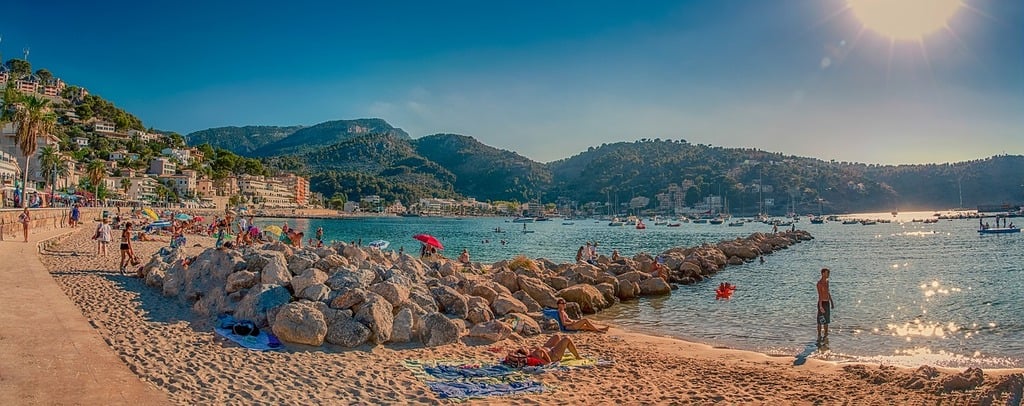Business
Majorca Sees 20% Drop in Tourism Amid Protests and Backlash

Majorca, a celebrated holiday destination in Spain, is experiencing a significant decline in tourism, with a reported drop of 20% in visitor numbers in July compared to the previous year. This downturn follows a series of intense anti-tourism protests that have unfolded across the island this summer. Local businesses, particularly bars and restaurants, are feeling the financial strain as they face urgent calls for reform and reassurance aimed at potential tourists.
The Balearic Islands Employers Association (CAEB) indicates that revenue from bars and restaurants has sharply decreased, with some establishments in popular areas like Palma, Sóller, and Capdepera reporting customer declines of up to 40%. Activists from grassroots groups such as SOS Residentes are at the forefront of the protests, voicing their concerns about the sustainability of the tourism industry. One activist told The Telegraph, “Today, the only future for young people is to work as a waiter or in tourism… But tourism is an easy way to earn money, and the easy way will kill us all.”
Residents express frustration with what they see as a “tourism monoculture” that benefits large investors and hotel chains while leaving local wages stagnant and communities displaced. The protests reflect a broader discontent with government policies perceived to prioritize profit over local residents’ quality of life.
Since the beginning of 2023, protests have escalated, with groups like Menys Turisme, Més Vida and SOS Residentes staging various demonstrations. Activities have included blocking buses, erecting fake danger signs, and even hosting dinner parties in public spaces. In June alone, coordinated protests attracted around 10,000 participants in Palma, echoing similar demonstrations from previous years. The message resonated with demonstrators: “Less tourism, more life.”
The Hotel Business Federation (FEHM) has initiated a “Tourist, Go Home Happy” campaign, deploying posters and digital banners aimed at welcoming visitors back to the island. This effort seeks to counteract the negative sentiments fostered by the protests and protect jobs within the tourism sector. Nevertheless, local businesses are bracing for a challenging period. The Restaurants Association in Mallorca warns that some establishments may close by the end of the year due to the sharp decline in customer footfall.
Despite the challenges, Majorca remains a sought-after destination. Jaume Bauzà, the Tourism Minister, asserts that overall visitor numbers continue to be high, and a communications campaign has been launched to reassure potential holidaymakers that the island remains welcoming and safe. However, the divide between residents and policymakers remains significant, with activists advocating for a shift toward “higher-quality” tourism that emphasizes economic and cultural value over sheer visitor numbers.
As the situation unfolds, the tourism sector in Majorca finds itself at a crossroads. The ongoing protests highlight deep-rooted concerns over sustainability, local identity, and the overall impact of mass tourism. The idyllic beaches and vibrant bars of Majorca are no longer just symbols of leisure; they represent a growing struggle over the future of the island and its communities. The coming months will be critical in determining how this balance can be achieved while preserving what makes Majorca a unique destination.
-

 Health2 months ago
Health2 months agoNeurologist Warns Excessive Use of Supplements Can Harm Brain
-

 Health2 months ago
Health2 months agoFiona Phillips’ Husband Shares Heartfelt Update on Her Alzheimer’s Journey
-

 Science1 week ago
Science1 week agoBrian Cox Addresses Claims of Alien Probe in 3I/ATLAS Discovery
-

 Science7 days ago
Science7 days agoNASA Investigates Unusual Comet 3I/ATLAS; New Findings Emerge
-

 Science4 days ago
Science4 days agoScientists Examine 3I/ATLAS: Alien Artifact or Cosmic Oddity?
-

 Entertainment4 months ago
Entertainment4 months agoKerry Katona Discusses Future Baby Plans and Brian McFadden’s Wedding
-

 World2 months ago
World2 months agoCole Palmer’s Cryptic Message to Kobbie Mainoo Following Loan Talks
-

 Entertainment3 months ago
Entertainment3 months agoEmmerdale Faces Tension as Dylan and April’s Lives Hang in the Balance
-

 Entertainment3 months ago
Entertainment3 months agoLove Island Star Toni Laite’s Mother Expresses Disappointment Over Coupling Decision
-

 Entertainment2 months ago
Entertainment2 months agoMajor Cast Changes at Coronation Street: Exits and Returns in 2025
-

 World2 months ago
World2 months agoCoronation Street’s Asha Alahan Faces Heartbreaking Assault
-

 Entertainment2 weeks ago
Entertainment2 weeks agoStefan Dennis and Dianne Buswell Share Health Update on Strictly Come Dancing









